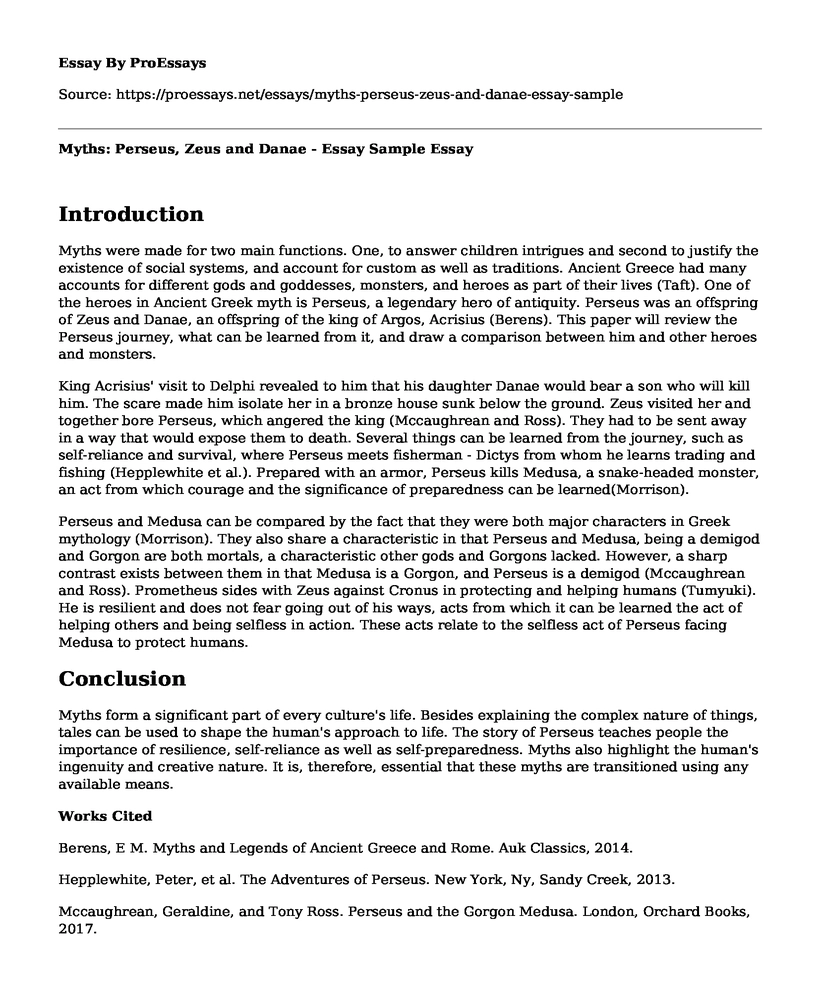Introduction
Myths were made for two main functions. One, to answer children intrigues and second to justify the existence of social systems, and account for custom as well as traditions. Ancient Greece had many accounts for different gods and goddesses, monsters, and heroes as part of their lives (Taft). One of the heroes in Ancient Greek myth is Perseus, a legendary hero of antiquity. Perseus was an offspring of Zeus and Danae, an offspring of the king of Argos, Acrisius (Berens). This paper will review the Perseus journey, what can be learned from it, and draw a comparison between him and other heroes and monsters.
King Acrisius' visit to Delphi revealed to him that his daughter Danae would bear a son who will kill him. The scare made him isolate her in a bronze house sunk below the ground. Zeus visited her and together bore Perseus, which angered the king (Mccaughrean and Ross). They had to be sent away in a way that would expose them to death. Several things can be learned from the journey, such as self-reliance and survival, where Perseus meets fisherman - Dictys from whom he learns trading and fishing (Hepplewhite et al.). Prepared with an armor, Perseus kills Medusa, a snake-headed monster, an act from which courage and the significance of preparedness can be learned(Morrison).
Perseus and Medusa can be compared by the fact that they were both major characters in Greek mythology (Morrison). They also share a characteristic in that Perseus and Medusa, being a demigod and Gorgon are both mortals, a characteristic other gods and Gorgons lacked. However, a sharp contrast exists between them in that Medusa is a Gorgon, and Perseus is a demigod (Mccaughrean and Ross). Prometheus sides with Zeus against Cronus in protecting and helping humans (Tumyuki). He is resilient and does not fear going out of his ways, acts from which it can be learned the act of helping others and being selfless in action. These acts relate to the selfless act of Perseus facing Medusa to protect humans.
Conclusion
Myths form a significant part of every culture's life. Besides explaining the complex nature of things, tales can be used to shape the human's approach to life. The story of Perseus teaches people the importance of resilience, self-reliance as well as self-preparedness. Myths also highlight the human's ingenuity and creative nature. It is, therefore, essential that these myths are transitioned using any available means.
Works Cited
Berens, E M. Myths and Legends of Ancient Greece and Rome. Auk Classics, 2014.
Hepplewhite, Peter, et al. The Adventures of Perseus. New York, Ny, Sandy Creek, 2013.
Mccaughrean, Geraldine, and Tony Ross. Perseus and the Gorgon Medusa. London, Orchard Books, 2017.
Morrison, Philip. "Book Review: Astronomy in Myth: Medusa: Solving the Mystery of the Gorgon." Journal for the History of Astronomy, vol. 32, no. 1, Feb. 2001, pp. 89-90, 10.1177/002182860103200111. Accessed 1 Mar. 2020.
Taft, Michael W. Greek Gods & Goddesses. New York, Britannica Educational Publishing in Association with Rosen Educational Services, 2014.
Tumyuki. "Greek Mythology: SECOND DYNASTY - CRONUS (Saturn)." Mythtalk, 28 Feb. 2015, parallelmyth.wordpress.com/2015/02/28/greek-mythology-second-dynasty-cronus-saturn/. Accessed 1 Mar. 2020.
Cite this page
Myths: Perseus, Zeus and Danae - Essay Sample. (2023, Apr 10). Retrieved from https://proessays.net/essays/myths-perseus-zeus-and-danae-essay-sample
If you are the original author of this essay and no longer wish to have it published on the ProEssays website, please click below to request its removal:
- Critical Essay Sample on Death of a Salesman
- Film Analysis Essay on Twelve Years a Slave
- The Yellow Paper by Gilman Charlotte - Critical Essay
- Literary Analysis Essay on Standard Loneliness Package
- Cannery Row Essay Example
- Essay Sample on America in Great Depression
- Essay Sample on Role of Women in Greek Mythology







